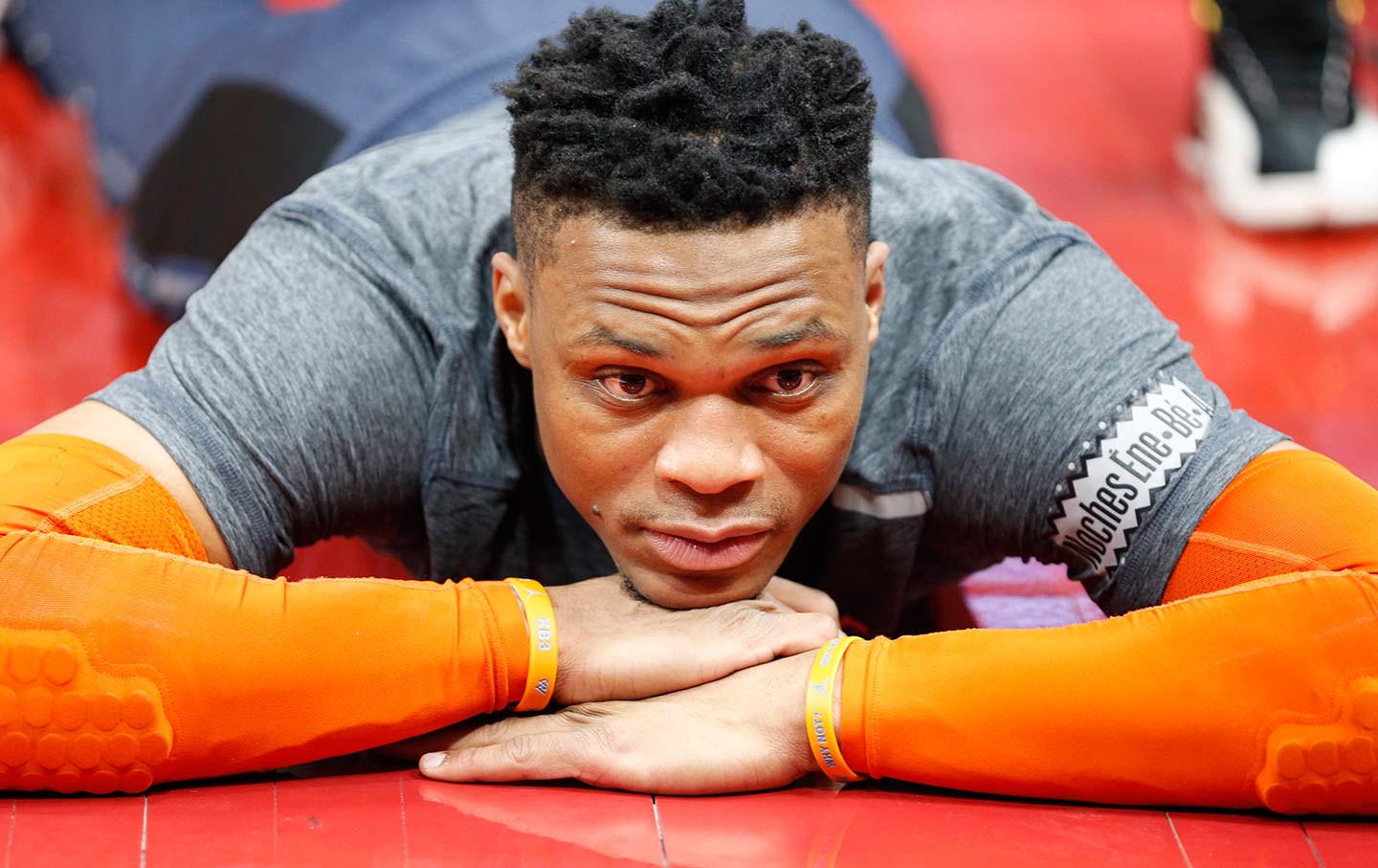
Oklahoma City Thunder guard Russell Westbrook before the start of their game against the Utah Jazz on March 11 in Salt Lake City. (AP Photo / Rick Bowmer)
Out of crisis can often come progress. Perhaps, at long last, that’s happening in Salt Lake City, home of the Utah Jazz. The crisis occurred Monday night, when the Oklahoma City Thunder’s all-world point guard Russell Westbrook was taunted by a Jazz fan in racialized terms. Before people knew what the fan, Shane Keisel, had said—and before they knew who Keisel was—the sports world had a collective conniption fit as Russell Westbrook was caught on video cursing him out. Westbrook said ,“I promise you. You think I’m playing? I swear to god. I swear to god. I’ll fuck you up. You and your wife, I’ll fuck you up. [turns towards the court] Nah, fuck that! Nah, fuck that! [turns back to fan] I promise you. On everything I love. Everything I love, I promise you. I swear to god.”
Westbrook says that Keisel and his wife, after some back and forth, told him to “get on your knees like you’re used to.”
Shane Keisel denies saying “get on your knees,” and gave a defiant interview where he called Westbrook “classless.” But following the viral incident he deleted old social-media posts, including racist trash like the use of the N-word, saying that Westbrook “should go back where he came from. #MAGA,” and calling Westbrook “a classless shit. Somebody should kick his ass.”
After the game, Westbrook said that he believed that the man was making a “racial” comment and “If I had to do it over again, I would say the same exact thing.”
His teammate Patrick Patterson, defended Westbrook, writing on social media, “Fans can say shit about a mans family, wife, & kids.. Tell a player “Get down on your knees like your use to.” As men, what do you expect us to do? Shut up & dribble? No one is held accountable for their actions except for us. Fans are protected in every way possible but not us.” Another teammate, Raymond Felton, also backed up Westbrook’s account.
This incident doesn’t exist in a vacuum. Salt Lake City has a long reputation for fans’ treating visiting black players poorly. As 10-year NBA veteran (and my radio cohost) Etan Thomas said to me, “I remember the atmosphere in Utah reminding me of one of those movies from the ’60s when they had segregated schools and the black team would come play the white team. Like the movie Glory Road or something. That’s what the atmosphere reminded me of, and hearing different NBA players talk now, not much has changed from when I played.”
But, again, out of crisis, calcification can crumble and we may be seeing a step in the right direction. In the aftermath of this incident, the Utah Jazz, acted swiftly—and surprisingly—by banning Keisel from future games. After speaking to witnesses and viewing videotape, the team determined that Westbrook was telling the truth. Jazz president Steve Starks said in a statement:
Everyone deserves the opportunity to enjoy and play the game in a safe, positive and inclusive environment. Offensive and abusive behavior does not reflect the values of the Miller family, our organization and the community. We all have a responsibility to respect the game of basketball and, more importantly, each other as human beings.
In another welcome development, Utah Jazz star player Donovan Mitchell put out his own lengthy statement where he wrote in part, “Racism and hate speech hurt us all, and this is not the first time something like this has happened in our arena…. Over the coming months I will work with the team, my teammates and the league to help make our arenas and our communities more inclusive and welcoming. That includes bans on hate speech and racism.”
Utah teammate Thabo Sefolosha—whom casual fans may remember from the time the NYPD broke his leg—also took to Instagram to say that he “stand[s] 100% with Russell Westbrook.… Support and cheer for your team and enjoy the action but fans like Shane Keisel who use that platform to spur there[sic] hateful and racist views need to be held accountable.”
Russell Westbrook has still been fined $25,000 by Commissioner Adam Silver “for directing profanity and threatening language to a fan.” But, overall, the response to the incident suggests that at least the Jazz organization may be turning a corner.
Dave ZirinDave Zirin is the sports editor at The Nation. He is the author of 11 books on the politics of sports. He is also the coproducer and writer of the new documentary Behind the Shield: The Power and Politics of the NFL.